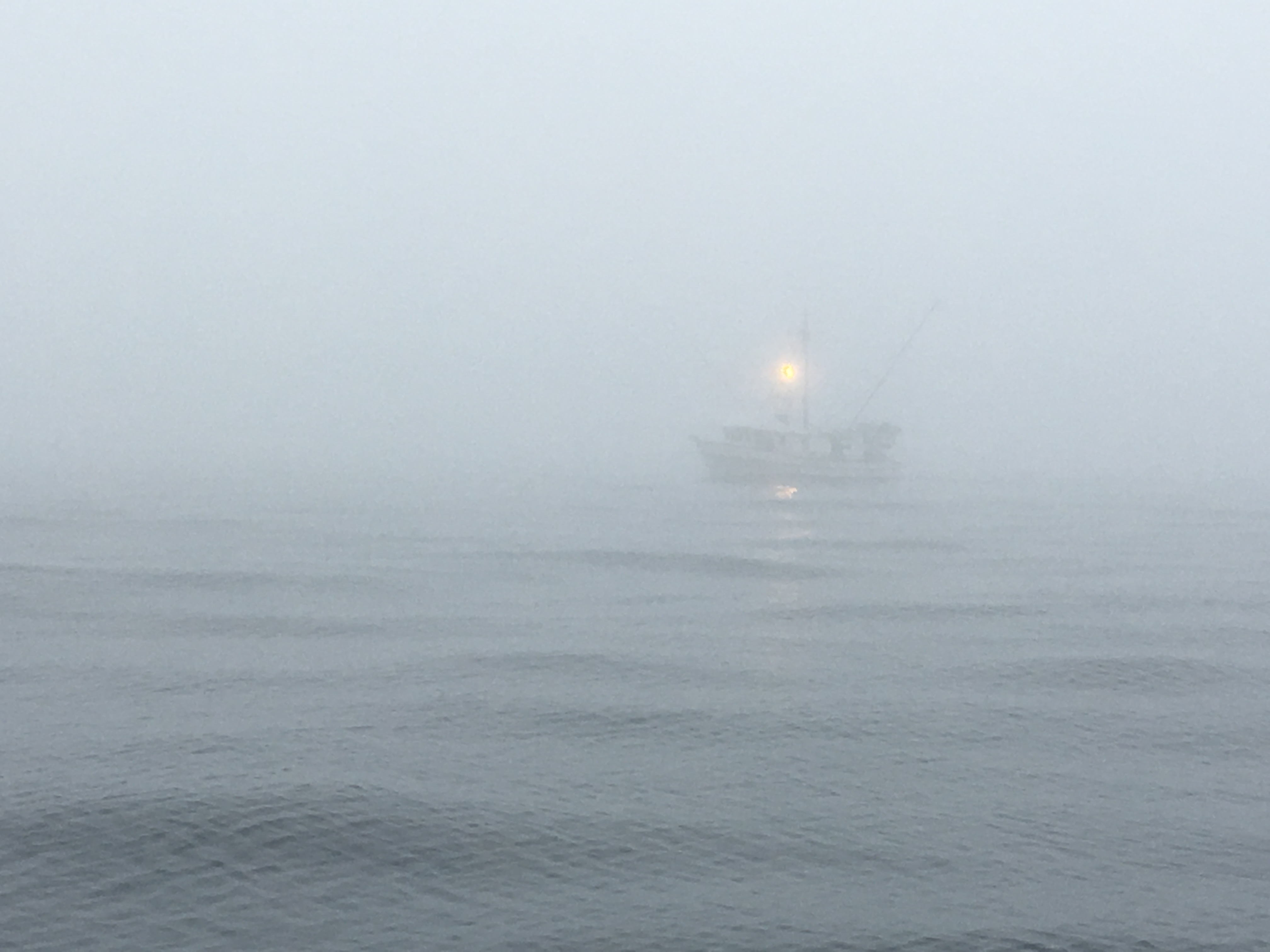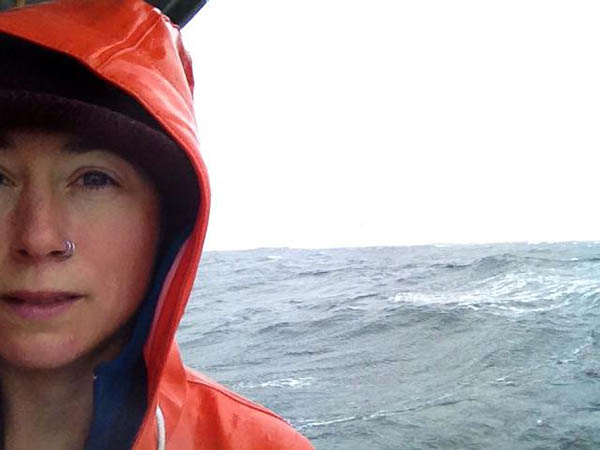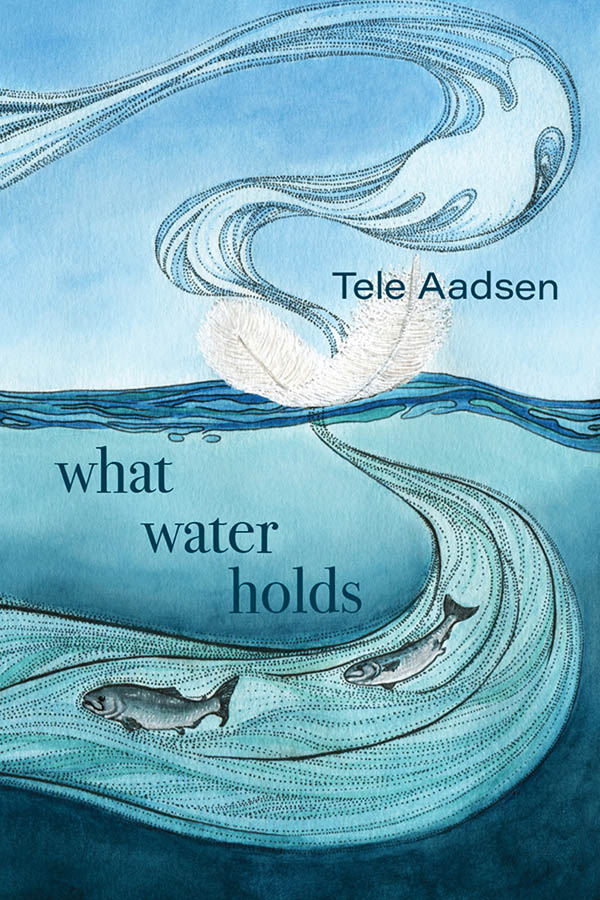I wrote this for FisherPoets Gathering 2019. All this time later, I remain thankful for the deeply healing gift of sharing these words with a compassionate audience in the sacred space of Astoria’s KALA Gallery. Maybe it’s strange to post now, a piece on depression amidst summer’s buoyant days. Or maybe it’s exactly right to post now, as Joel & I have our seasonal Sitka homecoming & prepare to start the Nerka’s 2019 season, opening July 1. As we come home.
Like a lot of fisherfolks, there are many reasons why I’ve built my life around this work. Few of those reasons are about money. For the bemused land friends who sometimes ask how long I think I’ll keep fishing — the first answer is, “As long as it’s an option.” The second answer is in this essay.
Thanks for reading, friends. If you’d prefer to listen, audio link here.
****
On December 28, 2018, after spending an hour sobbing in my parked car for no identified reason and unable to stop, I drove to a walk-in clinic and begged to be seen. Within minutes, I sat with a doctor. He eased into his assessment, first inquiring what I do for a living, then gently asking what was going on. I described the previous ten months, near-constant bouts of uncontrollable crying, anxiety, and panic, relieved only by welcome periods of numbness. He peered at me through heavy glasses. “Maybe you should consider a career other than fishing.”
I laughed. A real, honest-to-goodness laugh – the first of its kind in a long time – with the indulgent smile you’d give a child, because his suggestion was so assuredly, absurdly not the solution for my particular problem. Fishing is the one true thing holding me together. It always has been.
****
The sadness washed over me last winter. What started as one concrete loss swelled into a tsunami hopelessness I’d never experienced in my 41 years, so full-bodied it was like being seasick. Sad-sick: nauseous, limp and boneless, yet limbs so heavy I couldn’t move. Anyone who’s been incapacitated by seasickness knows it’s the worst feeling in the world. You want to die.
The back roads leading to my house are forested S‑curves twisting over deep ravines. Within the throes of sad-sickness, it’s easy to drive those roads too fast, take the turns too sharp. Part of fishing’s lure was self-preservation. The ocean has no inviting edges. I am safest on the ocean.
****
The ocean has been saving my life since I was a child. As a hurting teenager, I left my mom’s house at fifteen, yet still came back every fishing season to crew on her boat. At twenty-six, I fled the trauma of my social work career to return to fishing. I did it gracelessly, executing the most purely selfish act of my life, and it worked. The ocean healed my hurting places. It made me feel whole again.
This is my story, but so many of us could tell it. So many fisherfolks go to sea by our own unique version of the same dilemma: we don’t quite fit anywhere else. Land life is simultaneously chaotic and muted, too loud while saying little. We go through the motions, passing time between seasons: we are either fishing, coming back from fishing, or preparing to go fishing. Some claim to be over it, want something different, yet I see them back on the same decks year after year. On the ocean, we understand and accept the risks. It’s where we’re honest with ourselves. We know when we’re afraid. When we’re hurt. When we’re alive. On land, I’ve slogged through the days and every interaction is exhausting and with every unanswered email and ignored voice mail it’s ever more evident something’s missing, I’ve lost my bearings, but outwardly I hold it together, outwardly I seem to have my shit together, and when anyone peers too close I swing diversions like a gaff – “Tell me about YOU, how are YOU doing?” – summoning whatever last bit of energy I have to keep them from knowing how far out to sea I really am.
Fishing doesn’t allow that deceit. From boots firmly grounded on deck to spray stinging your face, fishing yanks you into your body, into this moment. Here and now, the ocean forces an awareness of your surroundings – the enormity of this wild world and nature’s forces, so much greater than amorphous, existential despair. There’s comfort in that. Yearning for reassurance, bone-deep desperation too heavy to impose on another person? The ocean can take it. The universal pains of being human – our fear, loneliness, uncertainty, doubt… The ocean is big enough to hold it all.
I went into last summer praying the ocean would once again deliver that same magic. Fishing’s special blend of physical labor, sleep deprivation, suns rising over mountains and setting into the deep blue, working alongside my love, that would be the perfect alchemy to fix me. The ocean would wash the sadness away.
But that’s not how depression works.
****
On January 9th, 2019, less than two weeks after the doctor suggested I quit fishing, the news broke about the Mary B II. The Newport crab boat had rolled while crossing the bar the night before. All three fishermen lost. By the unlikeliest gift of grace and luck, the Coast Guard retrieved all three bodies. Small mercies matter, when they’re all you have.
I was with a fishing friend that day. We were quiet, walking through Seattle drizzle, raindrops patting our shoulders, when this message appeared spray-painted on the sidewalk beneath our feet.
I want to believe in a world where you come home to me.
God, do I ever.
I want to believe in a world where we come home to ourselves. I want to believe in a world where we weather the storms and right our ships. Where we get a May Day call off in time and make it into our survival suits in time and banshee winds don’t rip the life raft out of reach and we don’t run out of time, we all manage to pile in together and cling to each other through the night, through the day, through however long it takes until rescue comes. A world where rescue does come. Where white-knuckled, puckered-up free-falls screaming down down DOWN the gullet of a seemingly bottomless wave end not with us being devoured but spat safely across the bar, sliding limp and disbelieving into a stall where we’re embraced by dockmates who recognize the haunting in our eyes; they’ve been there, too. I want to believe in a world where we are gentle and patient and love ourselves just as we are, leaving a light on so all our lost, battered souls might find their way home.
****
I’d planned to sit this year’s FisherPoets Gathering out. Writing is an act of intimacy, an exchange of truth-telling and trust. I’ve spent the past year lying. No spark within; no artistry to give. In the sad-sick paralysis, I’d dismissed a paradoxical rule of writing, which applies equally to human connection: vulnerability generates strength. The ocean was where I went to be honest with myself, going deep in that stripped-down, silent space. I come here, to these words, to be honest with you. This is what I’ve needed to say. Maybe it’s what one of you needed to hear.
So many of us have been here, or are here still. So many of us wear the camouflage smile, repeating that we’re fine, we’re fine, only to lie awake at night consumed with inexplicable grief, questioning our choices, our path, ourselves. Wondering if we’ll ever be the person we wanted to be, the person we were supposed to be, the one everybody believes we are. And still we muddle through. Trudging onward, we keep going.
And you land friends living with your own sad-sickness: I see you. I wish you could see yourself as I do, your courage and resilience. Moving through the days without a countdown to the ocean’s intervention? I don’t know how you do it… but I’m thankful you do. However you are keeping yourself afloat, please hold fast to whatever works for you.
As for what may work for me? I took that doctor’s prescribed ten milligrams of daily hope, but I won’t take his advice. Come spring, I’ll fill my own prescription and go fishing again. This time, though, in returning to the ocean that has always been there for me, I’ll remember that you are, too. Maybe you’ll remember that, also? I’ll leave a light on for you, in that world where we all come home.




I’ve had a rough year as well. Thank you for the beautiful words.
Tears are my only response. And thanks for these hugely vulnerable amazingly healing words. Your writing your writing your writing. Such a healing balm. Please keep on doing this.
Thank you for a vulnerable, honest writing. It is not easy to be at home in this world for many of us (I am one). I appreciate your ability to express what I cannot and let us know we are not alone. I am glad you have a place of kindness, the sea, in your life.
Land folks don’t get it. The sea is a part of our essence. Without it we are less than whole. I am in the process of retiring from fishing. There is constant pain attached to this. I believe there always will be. I have to fight to not be consumed by my current work in the Human Services field . The lure to be workaholic (which can pay so well in the fishing industry) — is detrimental — as you know — when working with people in serving their needs. I miss the solace of the sea. So very much. Josh’s death shook me to the core. I will not take those kinds of risks with my boat — that were taken on the Mary B II. Josh — who was so encouraging of me going back on a boat — I am sure would understand this. My boat is for sale and she knows why. Right now, my job is to help keep the Saint Jude safe. In the end, we all just need to be safe. Land folks don’t get it — Tele. It can be very disorienting. Isn’t it ironic — how being tossed around a bit at sea — can clear the fog, the dizziness of dealing with life- and all the world can instantly become more right again? (I suspect this is an andrenaline junkie kind of thing.) The land folks we go to for help — they mean well. There is no advice I have to offer. I just feel the pain. I know the sea is your muse. Whether you choose to fish, or stay on land or a combination of both — I can offer you this: I will hold space for you as needed. Because — as a fellow boat kid — I get it. Namaste’
Would that land people had a refuge like the sea!!! There are many people walking around in need of quietness, peace, space.
Tele, that is beautiful and I hope you are coming back up. That kind of year happens to so many of us. You are braver than most of us. Much love.
Tele, that is beautiful. And I empathize —having had a year like that not so long ago. I hope this year is lighter for you. Much love
Tele, you need to come to Port Townsend and eat oysters/ black cod tips/ elk or lamb or tofu curry/ mushrooms. And laugh. I know you have tons of friends at home, but for gosh sake, we are all here to answer each other’s calls. Hey, what ya got, what they biting? isn’t just for the season. You know we always say there’e room for one more boat on the tack, hence there’s always room for one or two more at the table, movie, whatever.
Ah leaving land jobs. Driving away from that company parking lot and all those people inside the fence who forgot the point of making money was to live like a decent human was like the best day of fishing ever. The elation of all the fish on deck, the dread of having to get them down stairs and keep them in good shape, it was all there. What am I going to do next? Never make this freezing commute again!
Getting ice tomorrow, heading to where we last were fishing. Big steel troller just showed up. Sporties and treaty guys getting them, every one remarking on generous size of fish. 20 mg of hope tonight!
Love to all in the fleet.
Beautiful. Real. Honest. May the summer on the water help restore you, my dear.
Brought me to tears, don’t know why!
Love you, lady. “This is what I’ve needed to say. Maybe it’s what one of you needed to hear.”
It was. Thank you for the precious gift of your words.
What a wonderfully honest and raw self-exposure. Thanks for trusting to release it to all, both those who are close to you and share your pains, and also to those of us who are not of the sea. I’m also a member of several groups that feel that same “we’re the only ones who understand how I feel”. I’m a veteran, a [retired] male nurse, a custodial single parent, a queer person, and a few others. I say this not to diminish what you feel, but to simply say that I too understand what you have written, and wish you the best.
By the way, speaking as a former psych nurse, I agree with both of your prescriptions — let the doc help you a bit with chemicals, and also listen to yourself in what you know to be helpful and true.
Such a beautiful piece of writing to explain the unexplainable ! I am not ocean going but love people who are. One of my closest friends is right now going through the angst you describe so vividly. She is a land-based person married to an ocean going man. I will send her your story to let her know that I, too, will leave the light on for her. Thank you for your transparency in the midst of pain. God bless you and all the Fisher Poets.
Tele! I empathize with you and the abyss of depression. Some days it feels like you are walking across a sea of jello, just trying to get to the other side. Your post reminds me of how my own periods of seemingly unfathomable sadness often trigger memories of my youth spent out on the Big O – where I felt both small and fortunate to be alive and employed in such a holy environment. My body is too busted up for labor-intensive work like fishing anymore, but writing helps as does reading the honest and relatable words of talented fisherfolk like you.
My hope is that you find solace in the sharing of your soul as much as in conking that first fat king in the noggin on this fine opening day. Or so I recall.
Peace, love and new rubber gloves -
from your friend, the landlocked mermaid
Dear Tele, the summer of 2016 was my version of what you described. Endless crying, not able to move, showers and eating took an enormity of effort and focus. And I was on a prescription. Thankfully several friends caught on and managed to get me to an appointment and then things started to change. Laying out in the pasture with the goats is my version of the sea, taking me out of “real” life and grounding me in the earth. For me the opposite is true in terms of adrenaline, given what I deal with on a daily basis, calm and quiet are what I need and I find it with my caprine companions. All 12 of them. I wish you a safe, productive and homecoming of a season. xoxoxo Adrienne
Careful with those s curves on the edge of ravines, We love you! We don’t want to miss you.